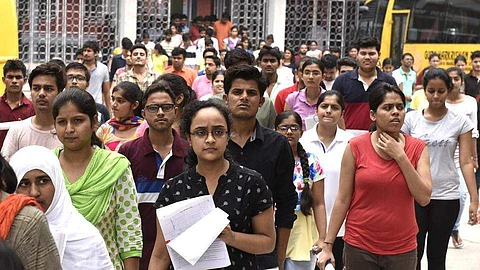

The seven-member committee headed by the former India Space Research Organisation (ISRO) head, Dr K Radhakrishan, has come up with key proposals related to the National Eligibility cum Entrance Test (NEET) and according to The Indian Express, it has submitted its report to the Education Ministry recently.
The committee was set up after the recent NEET paper leak. With regard to this, the committee was tasked with suggesting reforms to strengthen data security protocols, improve the examination process, and review the structure and operations of the NTA.
Key proposals made by the panel are:
1. Online testing methods and hybrid models
2. Rationalising Common University Entrance Test (CUET) subject choices
3. Increase in full-time staff of the National Testing Agency (NTA)
4. Less outsourcing to private centres
Firstly, the panel proposed holding entrance exams online wherever possible and using a hybrid model, where question papers are transmitted digitally but answered on paper, if needed. “This will significantly reduce the number of hands that the question paper passes through,” said a source, reported The Indian Express.
On CUET, the committee has suggested limiting the choice of subjects for candidates. At present, the NTA, which conducts CUET on behalf of the University Grants Commission (UGC), offers over 50 subjects, allowing candidates to take tests in up to six of them.
To improve the management and administration of the exam, NTA has been asked to hire more permanent staff members instead of relying on contract employees. Additionally, the panel has discouraged the use of private centres for conducting the exam.
The Radhakrishnan panel is also reported to have recommended that NEET-UG be conducted in multiple stages, preferably two, similar to the Joint Entrance Exam, which includes the Joint Entrance Examination (JEE) Main and JEE Advanced, due to the large number of aspirants. Nearly 20 lakh medical aspirants have registered for NEET-UG this year. Additionally, the panel suggested capping the number of attempts for NEET-UG, as currently, candidates can take the exam as many times as they wish.
Other exams
According to The Indian Express, the committee has not limited its recommendations to reforms for NEET alone but has also proposed long-term measures to secure all entrance tests conducted by the Centre.
Broadly, it is understood that the panel has advocated for greater government control over exam administration. This would include increasing the number of its own examination centres instead of outsourcing the conduct of exams to service providers and employing more permanent staff for the NTA, which relies heavily on contractual personnel.
